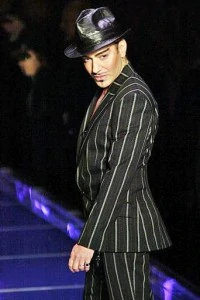John Galliano was fired from the famed fashion house of Dior because of anti-Semitic remarks he made to a non-Jewish couple at a café in Paris.
The comments were nefarious, wicked and unconscionable. They were disrespectful and showed an indifference towards the biggest genocide the world has witnessed.
When Galliano made the comments, his blood alcohol level was twice the legal limit allowed in France. And French law also makes it a crime to incite racial hatred. This law has been used to punish anti-Semitic remarks in the past. If convicted at trial, Galliano would face up to six months in prison and a hefty fine up to 31,000 Euros or $43,353 U.S. dollars.
As a practicing attorney, fashion designer, and blogger, Galliano’s firing set the wheels of my trained legal mind in action. My brain started somersaulting, analyzing various theories of law while comparing and contrasting the laws of the United States and France.
Would Galliano be prosecuted for the atrocious speech in the U.S.? Would the U.S. Constitution afford any protections to such blasphemous speech? Or would Galliano’s speech be considered “fighting words,” and unprotected by the First Amendment?
Galliano’s was fired the same week when the U.S. Supreme court issued a controversial decision addressing First Amendment Freedom of Speech in the case of Snyder v. Phelps (the Westboro Baptist Church case). Picketers appeared at the funeral of a soldier who died in Iraq and carried signs that said “God Hates the USA/Thank God for 9/11,” “Thank God for IEDs,” and “Thank God for Dead Soldiers.” The Court once again confirmed the broad parameters of Freedom of Speech. Chief Justice Roberts explained, “Such speech cannot be restricted simply because it is upsetting or arouses contempt. If there is a bedrock principle underlying the First Amendment, it is that the government may not prohibit the expression of an idea simply because society finds the idea itself offensive or disagreeable.”
Although First Amendment protection is broad, it is not absolute. The seminal 1942 case, Chaplinsky v. New Hampshire, established a restriction on Freedom of Speech called “fighting words.” Under the “fighting words” doctrine, the government can prohibit speech that is directed to a specific person and causes immediate injury (e.g., emotional harm) or tends to incite an immediate breach of the peace.
If the Galliano incident occurred in the U.S., he would shout out the defense of Freedom of Speech until his husky smoker’s voice acquired baritonic levels. Of course, Justice Roberts, who issued the majority opinion in the Snyder case, would be the “poster Judge” for the whimsical and eccentric designer.
Galliano would argue he was merely voicing an opinion, albeit a despicable one, but still an opinion; it was his expression; he was exercising his fundamental right of Freedom of Speech. And, if his words were merely “upsetting” or aroused “contempt,” his speech would be protected, just as in the Snyder case.
But his speech could be punished if it amounted to “fighting words.” Galliano would argue that he made the comments in a relaxed environment at a café in Paris while having dinner. He had twice the legal level of alcohol in his system. If you see the YouTube video the slurring of his speech and the droopiness of his eyes are evident. There was no loud swearing in the universal language of love; no shattering of champagne flutes brimming with Moet and Chandon (no pun intended LVMH); no throwing of his Dior fedora at anyone; and no slinging of Roquefort fromage at the café patrons. No breach of peace occurred or was threatened, he would say.
On the other hand, Galliano’s speech took place in France, a country bordering Germany where the persecution and murders of millions of Jews took place. The wounds of people have not healed and never will because of the heinous nature of the crimes.
Imagine if such comments were made at a 5th Avenue Jewish Rabbi Center in New York City—the result would be a provocation of emotions leading to plates of rugelach being thrown at Galliano, thereby leading to breach of peace. Context matters, a prosecutor would say.
It is a topic worth vigorous and open debate. We all have our opinions, and I am by no means justifying Galliano’s comments. I am simply analyzing them within the parameters of the mighty U.S. Constitution. It is a canopy of protections for the common man. Imagine living in a country where a mere opinion could lead to a beheading. It would be stifling and crippling to any form of expression. We are fortunate to have the protections and live the under the safe harbinger of U.S. Constitution.


